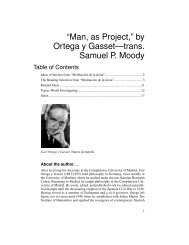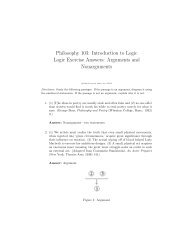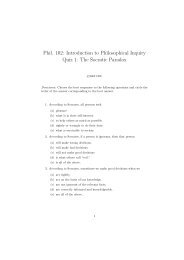“Happiness Is the Greatest Good” by Jeremy Bentham - Philosophy ...
“Happiness Is the Greatest Good” by Jeremy Bentham - Philosophy ...
“Happiness Is the Greatest Good” by Jeremy Bentham - Philosophy ...
You also want an ePaper? Increase the reach of your titles
YUMPU automatically turns print PDFs into web optimized ePapers that Google loves.
<strong>“Happiness</strong> <strong>Is</strong> <strong>the</strong> <strong>Greatest</strong> <strong>Good”</strong> <strong>by</strong> <strong>Jeremy</strong> <strong>Bentham</strong><br />
of pleasure. Having <strong>the</strong>n got thus far, and having forgot <strong>the</strong> point which<br />
<strong>the</strong>y set out from, <strong>the</strong>y pushed on, and went so much fur<strong>the</strong>r as to think it<br />
meritorious to fall in love with pain. Even this, we see, is at bottom but <strong>the</strong><br />
principle of utility misapplied.<br />
Chapter II—x. The principle of utility is capable of being consistently pursued;<br />
and it is but tautology to say, that <strong>the</strong> more consistently it is pursued,<br />
<strong>the</strong> better it must ever be for human-kind. The principle of asceticism never<br />
was, nor ever can be, consistently pursued <strong>by</strong> any living creature. Let but<br />
one tenth part of <strong>the</strong> inhabitants of this earth pursue it consistently, and in<br />
a day’s time <strong>the</strong>y will have turned it into a hell.<br />
Chapter II—xi. Among principles adverse to that of utility, that which at<br />
this day seems to have most influence in matters of government, is what<br />
may be called <strong>the</strong> principle of sympathy and antipathy. By <strong>the</strong> principle<br />
of sympathy and antipathy, I mean that principle which approves or disapproves<br />
of certain actions, not on account of <strong>the</strong>ir tending to augment<br />
<strong>the</strong> happiness, nor yet on account of <strong>the</strong>ir tending to diminish <strong>the</strong> happiness<br />
of <strong>the</strong> party whose interest is in question, but merely because a man<br />
finds himself disposed to approve or disapprove of <strong>the</strong>m: holding up that<br />
approbation or disapprobation as a sufficient reason for itself, and disclaiming<br />
<strong>the</strong> necessity of looking out for any extrinsic ground. Thus far<br />
in <strong>the</strong> general department of morals: and in <strong>the</strong> particular department of<br />
politics, measuring out <strong>the</strong> quantum (as well as determining <strong>the</strong> ground)<br />
of punishment, <strong>by</strong> <strong>the</strong> degree of <strong>the</strong> disapprobation.<br />
Chapter II—xii. It is manifest, that this is ra<strong>the</strong>r a principle in name than<br />
in reality: it is not a positive principle of itself, so much as a term employed<br />
to signify <strong>the</strong> negation of all principle. What one expects to find<br />
in a principle is something that points out some external consideration, as<br />
a means of warranting and guiding <strong>the</strong> internal sentiments of approbation<br />
and disapprobation: this expectation is but ill fulfilled <strong>by</strong> a proposition,<br />
which does nei<strong>the</strong>r more nor less than hold up each of those sentiments as<br />
a ground and standard for itself.<br />
Chapter II—xiii. In looking over <strong>the</strong> catalogue of human actions (says<br />
a partizan of this principle) in order to determine which of <strong>the</strong>m are to<br />
be marked with <strong>the</strong> seal of disapprobation, you need but to take counsel<br />
of your own feelings: whatever you find in yourself a propensity to condemn,<br />
is wrong for that very reason. For <strong>the</strong> same reason it is also meet<br />
for punishment: in what proportion it is adverse to utility, or whe<strong>the</strong>r it be<br />
adverse to utility at all, is a matter that makes no difference. In that same<br />
proportion also is it meet for punishment: if you hate much, punish much:<br />
if you hate little, punish little: punish as you hate. If you hate not at all,<br />
6 Reading For Philosophical Inquiry: A Brief Introduction

















